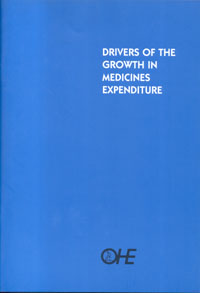Unlocking the Value of Combination Therapies

Increases in expenditure on medicines, above the level of increases in health care expenditure generally, are a feature of all Western health systems, including the UK’s. This paper examines the causes of these increases in the UK. It reports on a study carried…
Increases in expenditure on medicines, above the level of increases in health care expenditure generally, are a feature of all Western health systems, including the UK’s. This paper examines the causes of these increases in the UK. It reports on a study carried out by the Office of Health Economics, with technical assistance from the Department of Health, under the auspices of the Industry Strategy Group, a forum for joint discussion of matters of strategic interest to the pharmaceutical industry and the Government. The study shows that the position is complex: a number of different forces are at work. Analysis suggests that the largest effect is that of ‘product mix’, the prescribing of newer, more expensive medicines, followed by the ‘volume effect’, comprising growth in the number of prescription items and in the number of tablets per prescription. As the paper shows in examining growth in asthma prescribing, these effects are driven by innovation, morbidity, demography and changing treatment patterns. The detailed analysis presented in this paper provides important background for the current debate about NHS expenditure and the Government’s own Comprehensive Spending Review. The paper concludes that expenditure on medicines can be expected to show continued real growth and take an increasing share of total NHS expenditure in the medium term. The challenge for the Government, pharmaceutical industry and medical profession is to ensure that we have and use medical advances offering genuine benefit to patients whilst seeking to ensure that all expenditure on medicines represents value for money for patients and the NHS as a whole.
Drivers of the Growth in Medicines Expenditure
Marchant, N.
(1997) Drivers of the Growth in Medicines Expenditure. OHE Monograph. Available from https://www.ohe.org/publications/drivers-growth-medicines-expenditure/